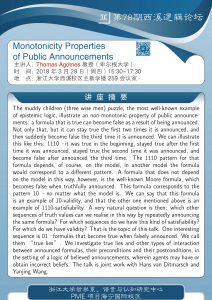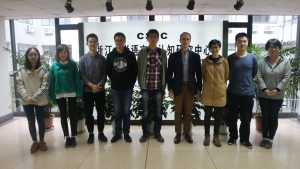Thomas Ågotnes: Monotonicity Properties of Public Announcements [2018-3-29]
西溪逻辑论坛第78期
 Date: 29th March 2018 (15:30-17:30)
Date: 29th March 2018 (15:30-17:30)
Venue: Room 259, Main Teaching Building, Xixi Campus, Zhejiang University
Speaker: Prof. Thomas Ågotnes (University of Bergen & Zhejiang University)
Title: Monotonicity Properties of Public Announcements
Abstract: The muddy children (three wise men) puzzle, the most well-known example of epistemic logic, illustrate an non-monotonic property of public announcements: a formula that is true can become false as a result of being announced. Not only that, but it can stay true the first two times it is announced, and then suddenly become false the third time it is announced. We can illustrate this like this: 1110 – it was true in the beginning, stayed true after the first time it was announced, stayed true the second time it was announced, and become false after announced the third time. The 1110 pattern for that formula depends, of course, on the model, in another model the formula would correspond to a different pattern. A formula that does not depend on the model in this way, however, is the well-known Moore formula, which becomes false when truthfully announced. This formula corresponds to the pattern 10 – no matter what the model is. We can say that this formula is an example of 10-validity, and that the other one mentioned above is an example of 1110-satisfiability. A very natural question is then: which other sequences of truth values can we realise in this way by repeatedly announcing the same formula? For which sequences do we have this kind of satisfiability? For which do we have validity? That is the topic of this talk. One interesting sequence is 01 – formulas that become true when falsely announced. We call them “true lies”. We investigate true lies and other types of interaction between announced formulas, their preconditions and their postconditions, in the setting of a logic of believed announcements, wherein agents may have or obtain incorrect beliefs. The talk is joint work with Hans van Ditmarsch and Yanjing Wang.
*This talk is supported by the PME (Philosophy, Mathematics & Economics) Program,Haining International Campus,Zhejiang University


